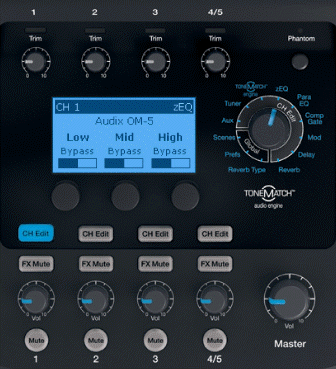Difference between revisions of "ToneMatch Mixer / zEQ"
(first ed) |
(No difference)
|
Revision as of 02:40, 1 September 2007
Contents
Official Description
From the T1 ToneMatch™ Audio Engine web page
Proprietary zEQ tone controls let you make further adjustments after selecting your ToneMatch preset. Ordinary tone controls are generic by design, with "High," "Mid," and "Low" controls spread out across the entire musical spectrum. But with the touch of a button, Bose zEQ automatically shifts the range of these controls to correspond directly to the range of your instrument. This innovative technology gives you more precise tone control, so it's easier to fine-tune your sound.
Quotes about zEQ from People-at-Bose
Ken-at-Bose
By selecting a ToneMatch™ preset, you're telling the T1 something about what you play or that you sing.
Once you do that, zEQ tone controls are automatically programmed to give you the three most useful tonal enhancements for that instrument or for the voice. We found these three top sensitive tonal ranges by listening.
So, for example, if you select a ToneMatch preset for an electric bass, the three tone controls are automatically programmed to provide the three most useful tonal enhancements we could find for the bass guitar.
This is profound. Think about the choices before: you'd have fixed-frequency and fixed-Q tone controls on a mixer that often didn't line up at all with what you wanted to boost or cut, or you'd have tone controls with variable frequency and Q that most people haven't a clue how to optimize.
We thought we could do all the work for you. WE took the time to explore the best center frequencies and the best Q values and custom designed three filters for each ToneMatch preset that tie to the instrument or voice.
Grab any of the three tone controls and they all do something useful.
Isn't that NEAT?
Ken[1]
Chris-at-Bose
zEQ automatically shifts the tone control center frequencies in response to the preset setting, at the time you choose the preset. zEQ "comes with the preset", invisibly.
Example: Suppose you are a singing bass player (imagine that!). You put your mic into Input 1 and choose a vocal mic preset there, and then you put your instrument into Input 2 and choose a bass guitar preset there. Now you boost the treble on your vocal channel and notice that your voice gets brighter and has stronger sibilants. Next you boost the treble on your instrument and notice that you get more snap and harmonics. The frequency ranges boosted by the two treble controls are different and are appropriate to the ranges of the instruments designated by the presets. Automagically, no secret menu tweaking, no user serviceable parts inside. You don't have to ask for it, you just get it, every time.
How about that?
Chris[2]
Hilmar-at-Bose
And for the techno-geeks:
We optimize not only the frequencies but also the exact shape of the tone controls. There is fairly large possible set of control shapes (notches and peaks with different widths, shelves with different steepness, spectral tilts, etc.) and we (or to be more precise Mike-Z and Cliff) have spend countless hours experimenting to find the best fit for each instrument.
The T1 supports individual zEQ settings for each preset. Although most acoustic guitar presets use the same zEQ, every now and then we find a particular model zEQ that works better with a different zEQ and we incorporate that into the specific preset for that model. Again, that's an example of "the more we know about your instrument, the better we can help you making it sound good".
Hope that helps
Hilmar[3]
MikeZ-at-Bose
There's a preset in the T1(tm) that is 'Flat' like 00, but has the zEQ controls for the bass - so you have the benefits of the BassPOD and zEQ.
This is true for every instrument category as well. There is a 'Flat' preset with that categories most common zEQ controls.-MikeZ[4]
- ↑ Ken-at-Bose talks about zEQ
- ↑ Chris-at-Bose talks about zEQ
- ↑ Hilmar-at-Bose talks about zEQ
- ↑ MikeZ-at-Bose talks about zEQ
